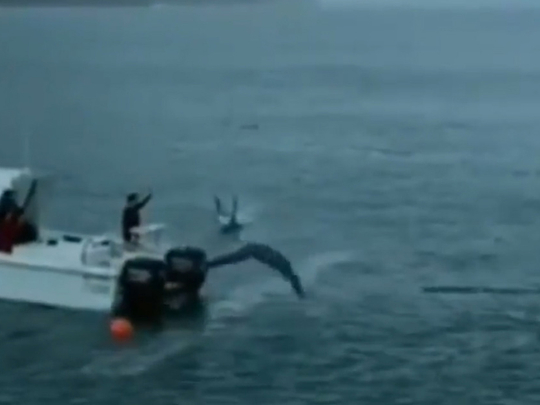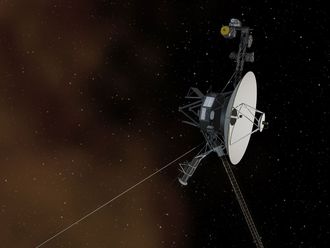
Washington: Remember back in December 2014, when Discovery Channel hyped that a man would be eaten and then regurgitated by a giant snake on a special called “Eaten Alive?” Then that didn’t actually happen, and viewers were furious?
We bring this up because 57 minutes into Discovery’s heavily promoted Sunday night Shark Week programme — in which Olympic powerhouse swimmer Michael Phelps was set to race against a great white shark — viewers heard this quote from ecologist Tristan Gutteridge, one the featured scientists:
“Clearly, we can’t put Michael in one lane and a white shark on the far lane. We’re gonna have to do a simulation.”
Hold on. So Phelps wasn’t going to actually race a shark in a TV event titled “Phelps vs. Shark: Great Gold vs. Great White”?! Why was the hourlong special billed as such?
While common sense probably could have saved any disappointment — along with pre-show interviews where Phelps assured everyone that he wouldn’t really race next to a shark in open water — many viewers were not pleased.
Throughout the episode, viewers watched as Gutteridge and the team collected data about the swim speed of sharks, which is apparently very hard to do, because sharks don’t typically swim in a straight line.
So, Gutteridge said, instead of Phelps and a shark swimming side by side, the scientists would use the speed data they obtained to create a computer-generated image of a shark racing. And Phelps would compete against that.
Unacceptable, said the internet. “YOU SAID HE WOULD FACE A SHARK, NOT A CGI SHARK,” one irritated viewer wrote on Twitter.
What really rubbed salt in the wound? Phelps lost.
The computer simulated great white shark swam 100 meters in 36.1 seconds. Phelps, fitted in a special wet suit and monofin that bound his feet together, took 38.1 seconds to swim the same distance. So close — but no dice.
Phelps looked disappointed, though not surprised. Earlier in the episode, when he saw a simulation of a 20-foot great white shark competing in an Olympic swimming pool, he knew it was a long shot. After all, the shark’s average speed of 25 miles per hour was more than four times Phelps’s own top speed in the pool.
“Honestly, the first thought that went through my head when I saw the shark, there’s probably very little chance for me to beat him,” he said.
At least Discovery had a sense of humour about this special, such as when the narrator mentioned Phelps’s many Olympic accolades: “Sharks don’t care about medals.” And for those still upset about the CGI shark situation, just remember that whenever Discovery hypes something crazy happening with an animal — well, there may be a twist that makes it not quite as exciting as it seems.












